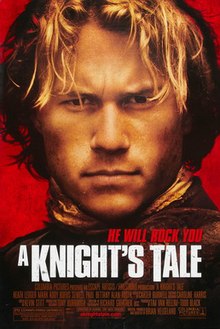A Knight's Tale
| A Knight's Tale | |
|---|---|

Theatrical release poster
|
|
| Directed by | Brian Helgeland |
| Produced by |
|
| Written by | Brian Helgeland |
| Based on |
The Knight's Tale by Geoffrey Chaucer |
| Starring | |
| Music by | Carter Burwell |
| Cinematography | Richard Greatrex |
|
Production
company |
|
| Distributed by | Columbia Pictures |
|
Release date
|
|
|
Running time
|
132 minutes 138 minutes(Extended cut) |
| Country | United States |
| Language | English |
| Budget | $65 million |
| Box office | $117.5 million |
A Knight's Tale is a 2001 medieval adventure comedy film written, produced, and directed by Brian Helgeland. The film stars Heath Ledger, Shannyn Sossamon, Mark Addy, Alan Tudyk, Rufus Sewell, Paul Bettany as Geoffrey Chaucer, and James Purefoy as Sir Thomas Colville/Edward, the Black Prince.
Told in an anachronistic style with many modern references, the film follows a peasant who pretends to be a knight, along with his companions, in the world of medieval jousting. William poses as a knight and competes in tournaments, winning accolades and acquiring friendships with such historical figures as Edward, the Black Prince of Wales and Geoffrey Chaucer.
The film takes its title from Chaucer's "The Knight's Tale" in his Canterbury Tales, though the plot is not especially similar. Garnering $117,487,473 with a budget of $65 million, it was a modest success at the box office.
At a jousting tournament in 14th-century Europe, young squires William Thatcher, Roland, and Wat discover that their master, Sir Ector, has died. If he had completed one final pass he would have won the tournament. Destitute, William wears Ector's armour to impersonate him, winning the tournament and taking the prize.
Although only nobles are allowed in tournaments, William is now inspired to compete and win more prizes. Roland and Wat would rather take their share of coins and leave, but William convinces them to stay and train him to joust. Along the way to his first tournament in Rouen, the trio encounters a young Geoffrey Chaucer, who is also destitute and agrees to forge the patent of nobility that will allow William to enter under the assumed name of "Sir Ulrich von Liechtenstein" from Gelderland. At the tournament, William is brought before Simon the Summoner and Peter the Pardoner: Chaucer has a gambling problem and is in their debt. William demands Chaucer be released and promises payment.
...
Wikipedia
